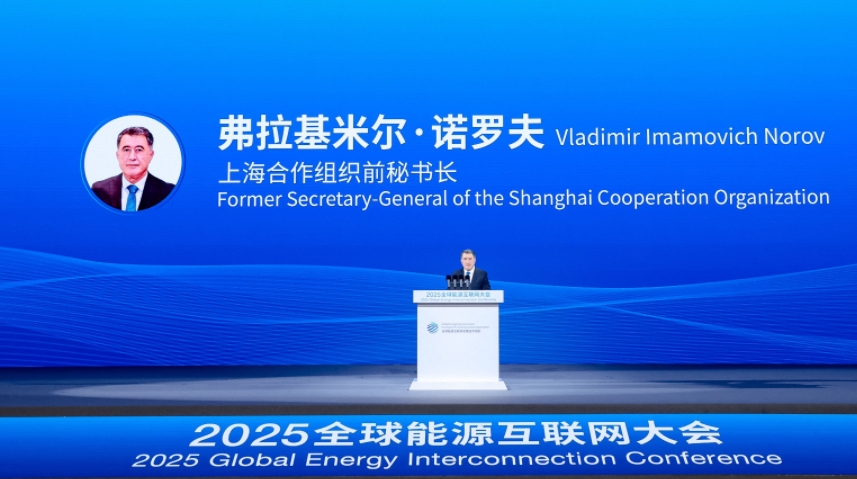
Vladimir Imamovich Norov, former secretary-general of the Shanghai Cooperation Organization, delivers a speech at the Global Energy Interconnection Conference held at the China National Convention Center in Beijing, Sept. 9, 2025. [Photo provided to China.org.cn]
Vladimir Imamovich Norov, former secretary-general of the Shanghai Cooperation Organization (SCO), urged global energy leaders to prioritize practical infrastructure projects and financing mechanisms to accelerate the clean energy transition.
Speaking with China.org.cn at the Global Energy Interconnection Conference, a Beijing summit focused on cross-border clean energy solutions, Norov said he wanted "purely pragmatic" outcomes that would create roadmaps for infrastructure projects, financing mechanisms, and the unification of technical standards.
He said the priority for Central Asian countries "is not an abstract 'green agenda,' but turning renewable potential into a sustainable export and internal energy supply system."
Norov cited the potential for broader regional energy integration. "By linking the hydro-excess of Tajikistan and Kyrgyzstan with the solar and wind generation of Kazakhstan and Uzbekistan, it is possible to create seasonally balanced electricity trade," he said.
He pointed to the CASA-1000 project as a working example of such cooperation. "The CASA-1000 project provides for the transfer of up to 1,300 MW of summer hydro-generation from Kyrgyzstan and Tajikistan to Pakistan via Afghanistan," he added.
Norov lauded the China-Central Asia energy partnership as key to this approach, citing three key strengths: "the pragmatism of agreements, infrastructure durability, and the combination of commercial incentives with regional development."
Chinese companies finance solar and wind power plants, while ensuring predictable revenues for local partners and stimulating technology transfer, he said. Examples include 2,000 MW solar facilities in Uzbekistan's Kashkadarya, Bukhara and Samarkand regions, plus Kazakhstan's 100 MW Zhanatas wind farm.
China also invests in cross-border electricity transmission systems, allowing optimal distribution of seasonal energy fluctuations. This broader infrastructure cooperation includes local capacity building. "Chinese companies participate in network modernization, job creation, and local specialist training. In Uzbekistan, over 200 engineers were trained at BYD, and Chinese contractors provide on-site equipment operation and maintenance knowledge," he noted.
He also highlighted the key role played by regional organizations, development banks and platforms like conference host Global Energy Interconnection Development and Cooperation Organization (GEIDCO), which turn political agreements into specific techno-economic projects.
"GEIDCO has established itself as a key player in promoting global energy interconnection, initiating projects on energy system digitalization, cross-border energy corridors and regional coordination," Norov noted.

Attendees gather at the Global Energy Interconnection Conference held at the China National Convention Center in Beijing, Sept. 9, 2025. [Photo provided to China.org.cn]
The organization, marking its 10th anniversary this year, now has partnerships with over 260 organizations and more than 1,000 members from 130 countries.
On strengthening SCO energy transition cooperation, Norov outlined three cooperation priorities: first, expanding professional exchanges between energy experts and creating specialized educational hubs; second, developing cross-border green pilot projects, such as wind farms that could be scaled regionally with GEIDCO and Chinese infrastructure support; and third, creating a mid-term program for SCO energy efficiency and green technologies aligned with the organization's 2035 cooperation framework.
"SCO countries have unique resources and experience, and the support of GEIDCO and alignment with global initiatives open the way to creating a sustainable energy system," Norov stressed. "Only through practical steps and joint projects can we turn the challenges of the energy transition into the foundation of regional and global development."
The three-day event, running Sept. 8-10 and hosted by GEIDCO, drew nearly 1,000 participants from over 100 countries to discuss clean energy solutions and cross-border power infrastructure.


 Share:
Share: 




 京公網(wǎng)安備 11010802027341號
京公網(wǎng)安備 11010802027341號